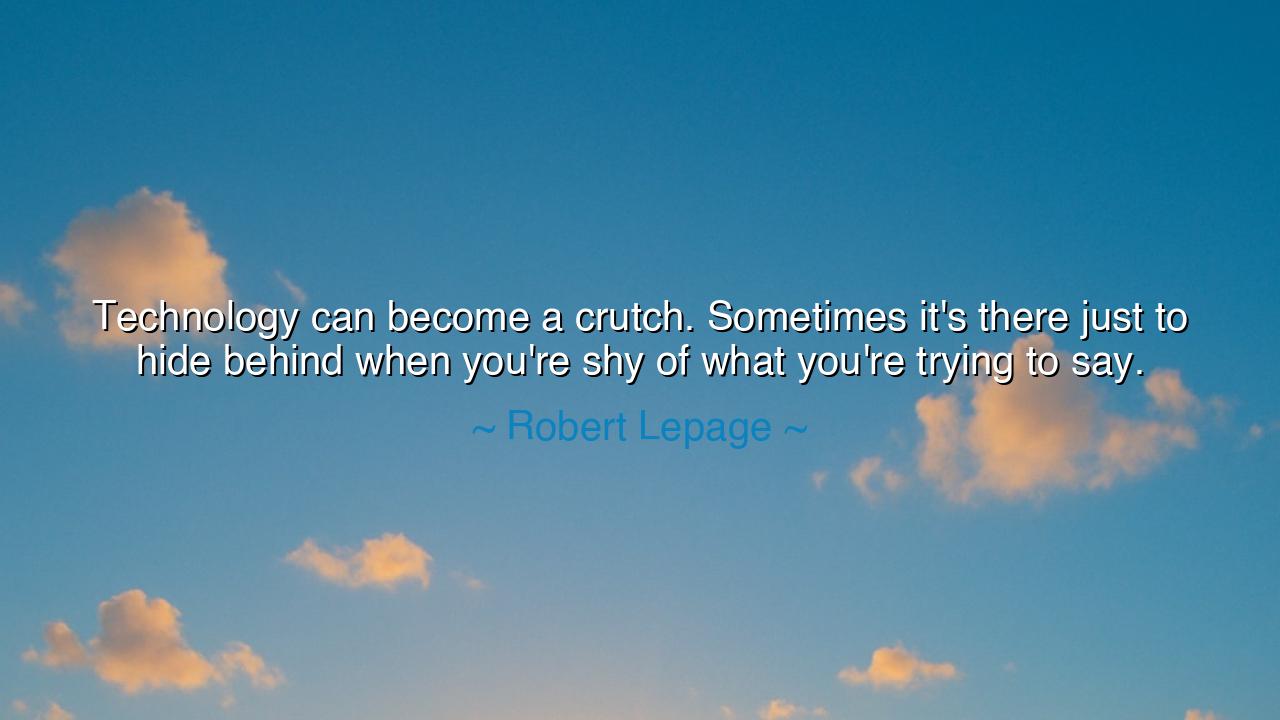
Technology can become a crutch. Sometimes it's there just to
Technology can become a crutch. Sometimes it's there just to hide behind when you're shy of what you're trying to say.






Hear the words of Robert Lepage, artist of stage and screen: “Technology can become a crutch. Sometimes it’s there just to hide behind when you’re shy of what you’re trying to say.” In these words lies a warning as old as the human heart, though spoken in the language of our modern age. For every tool created by man carries with it a double edge—it can serve as an extension of our power, or it can become a shield for our fear.
To call technology a crutch is not to deny its value, but to reveal its danger when misused. A crutch is meant to aid the wounded, yet if one leans on it too long, it weakens the leg instead of healing it. So it is with technology: it can magnify the voice of the creator, the speaker, the artist—but if it is used to hide behind, it can smother authenticity, replacing the raw truth of expression with the distraction of glitter and noise.
History gives us examples. In the theaters of ancient Greece, masks and choruses were tools—primitive technologies—to amplify emotion and voice. Yet the true power of tragedy came not from the mask, but from the words of Aeschylus, Sophocles, and Euripides. The stagecraft served the story, not the other way around. But in later ages, when spectacle grew greater than substance, the theater declined, leaving behind hollow performances that dazzled the eye but failed to touch the soul. Thus Lepage reminds us: the heart of art is not the tool, but the truth it carries.
Consider also the story of the Roman orator Cicero. He needed no device, no amplification, no distraction. His words alone, borne on breath and conviction, could move the Senate to fear, to rage, to unity. Had he hidden behind artifice, his message would have been diminished. So it is in every age: technology may carry the message farther, but it cannot replace the courage to speak what must be spoken.
Yet Lepage’s words are not only for artists, but for all who live in this age of devices. How many today hide behind screens, behind crafted images, behind the safe distance of text and post? We present versions of ourselves, polished and glowing, while the truth of our hearts remains unspoken. In such a way, technology ceases to liberate and becomes a prison, a barrier between us and the honesty of human connection.
The lesson is clear: use technology, but do not let it use you. Let it be a tool, not a disguise. When you must speak, speak from the heart, even if your voice trembles. When you must create, create with courage, and let the machine serve your truth, not bury it. For the world hungers not for polished illusions, but for sincerity—for the fire of words and deeds that come unhidden from the soul.
Practical wisdom lies here: the next time you reach for technology, ask yourself—am I using this to reveal, or to conceal? Am I letting it amplify my truth, or am I letting it hide my fear? If the answer is the latter, set it aside and trust in the raw strength of your humanity. For only through authenticity does art endure, does speech persuade, does life gain its deepest meaning.
So let Lepage’s words echo as a guide to this age of machines: “Technology can become a crutch.” Walk with it when needed, but do not lean on it so heavily that you forget how to stand on your own. Speak your truth plainly, and let the tool serve your voice—not replace it. For the human heart, when revealed without disguise, has always been the most powerful force in the world.






AAdministratorAdministrator
Welcome, honored guests. Please leave a comment, we will respond soon